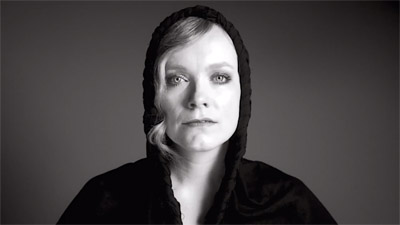These days autumnal precision is all we need…

[Video][Website]
[7.78]
Edward Okulicz: Twitchy percussion and the solemn humming of the organ create such an atmosphere of dread that when they all but vanish around the three-minute mark, you focus once more on Brun, steeling herself to remain calm under the stress of a memory. She sells a line like “a little further away/but I walk with you” with quiet terror, as if the details are too bleak to fill in.
[9]
Iain Mew: “Do You Remember” was chilling around its edges but “These Days” is chilling from start to finish. The organ hum and Ane Brun’s shiver of a vocal are disquieting already, but what takes the song over the edge are the drums, auguring gloom and terror in unpredictable rolls of thunder.
[9]
Brad Shoup: The second or third time I heard this, I had to quash the urge to contact someone from the past. “These Days” is exactly the sort of thing I used to take on walking soliloquies: crystalline, spare, with a flat emotional throughline. The kettledrum simmers like thunderclouds on the horizon, but Brun never allows it to erupt. “You spelled your name in charcoal/All over my body,” she exclaims: possibly an aural headshake, or even a claimed erotic memory. And while she executes the deadly “walk/talk” combo, she has the good sense to separate the phrases. It’s true, after all, that many relationships end with a declining frequency of slow conversations, and so it is here.
[9]
Jonathan Bogart: Sorry, all I have is an adjective dump: spare, hymnal, fragile, frosty, Protestant.
[9]
Anthony Easton: Sometimes music comes when it needs to come.
[9]
Katherine St Asaph: I saw Ane Brun at the Bowery Hotel earlier this summer, the sort of free show that sparks the exact revelations the outdoor-festival model of dumping a thousand twenty-somethings into a holding tank with singers, sweat, swill and smoke can’t. Five feet away, I was struck. She was so self-possessed you could practically see her tendons stiffen; she’d sing and it looked like spitting, or she’d move like she’d invented a new form of charades, one where you guess what invective she’s almost directing at you. (The video‘s not far off.) I don’t remember whether “These Days” was on the setlist, but everything about it would be apt. The percussion sits shaking, shouldering all her bitterness, the reverb on the chorus all the distance. Eventually there’s a piano that can’t do more but putter listlessly. It’s a masterpiece of restraint, but a specific sort: that of someone wishing so very hard she didn’t have to say any of it. She sings it so reluctantly, so well.
[9]
Zach Lyon: A song successful at what it sets out to do — controlled aching on one level with uncontrollable heaving beneath it — but not enough to hit. So damn consistent that the breakthrough of the middle eight seems like a token change, but the musical sensation of floating away doesn’t always call for a sudden hand around its ankle; now I spend the song waiting and waiting for it. The brighter, more transparent torch-carrier of “Do You Remember” is gone.
[6]
Alfred Soto: Ian Curtis and Jackson Browne wrung moments of dreadful self-reckoning from the title trope, and Ane Brun has a similar vastation in mind. Why I prefer Jessie Ware’s statuesque emoting to Brun’s is a mystery. Damned if I’ve recently faulted a vocalist for precision, but that’s the problem: her control doesn’t allow for happy accidents, her timbre too prissy for those rolling drums and that organ line.
[5]
Mallory O’Donnell: Rarely does so very little happen this well. Brun struggles to but doesn’t really ever emerge out of the Kate Bush/Portishead/Bjork concept-cluster, but that’s ok because the bar is so very low right now that even this kind of treading water sounds better than what most people do whilst swimming. In particular this sort of tasteful torch song seems conspicuously absent from the charts right now, and as such is quite welcome.
[5]